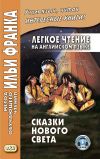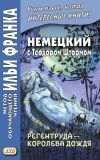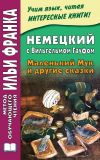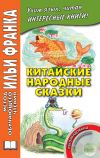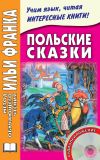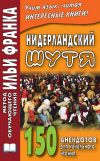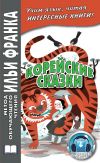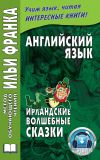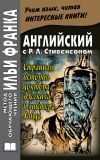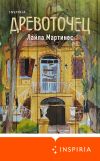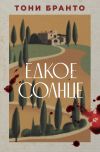Текст книги "Английский с Шерлоком Холмсом. Человек с рассеченной губой / Arthur Conan Doyle. Sherlock Holmes"
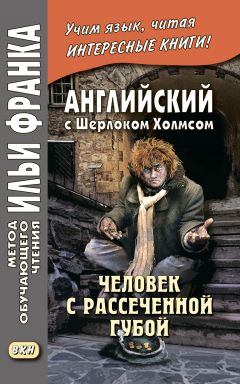
Автор книги: Артур Дойл
Жанр: Иностранные языки, Наука и Образование
Возрастные ограничения: +16
сообщить о неприемлемом содержимом
Текущая страница: 13 (всего у книги 21 страниц)
“A fair dowry (порядочное приданое). Not more than is usual in my family (не больше, чем принято в нашей семье; usual – обыкновенный, обычный; that is not usual here – здесь это не принято).”
“And this, of course, remains to you (и оно, конечно, останется в вашем распоряжении), since the marriage is a fait accompli (поскольку брак – совершившийся факт /франц./)?”
“I really have made no inquiries on the subject (на самом деле я не наводил справок на этот счет).”
“Very naturally not (естественно). Did you see Miss Doran on the day before the wedding (вы видели мисс Доран накануне свадьбы)?”
“Yes.”
“Was she in good spirits (она была в хорошем настроении)?”
“Never better (как нельзя лучше). She kept talking of what we should do in our future lives (продолжала говорить о том, что мы будем делать в наших будущих жизнях = все строила планы нашей будущей совместной жизни).”
“Indeed (вот как)! That is very interesting (это очень любопытно). And on the morning of the wedding (а утром в /день/ свадьбы)?”
dowry ['daʋ(ǝ)rɪ], fait accompli [,feɪtǝ'kɒmplɪ], future ['fju:ʧǝ]
“She brought, I understand, a considerable dowry?”
“A fair dowry. Not more than is usual in my family.”
“And this, of course, remains to you, since the marriage is a fait accompli?”
“I really have made no inquiries on the subject.”
“Very naturally not. Did you see Miss Doran on the day before the wedding?”
“Yes.”
“Was she in good spirits?”
“Never better. She kept talking of what we should do in our future lives.”
“Indeed! That is very interesting. And on the morning of the wedding?”
“She was as bright as possible (она была очень весела: «как /только/ возможно»; bright – яркий; веселый; живой, полный бодрости) – at least until after the ceremony (по крайней мере, до того, как кончилась церемония).”
“And did you observe any change in her then (потом вы заметили в ней какую-то перемену)?”
“Well, to tell the truth, I saw then the first signs that I had ever seen (по правде говоря, тогда я увидел первые признаки того) that her temper was just a little sharp (что ее нрав несколько резок; sharp – острый; крутой, резкий; суровый). The incident however, was too trivial to relate (впрочем, этот случай слишком незначителен, чтобы о нем говорить; to relate – рассказывать) and can have no possible bearing upon the case (и не может иметь ни малейшего отношения к этому делу).”
“Pray let us have it, for all that (тем не менее, прошу вас, расскажите нам).”
“Oh, it is childish (о, это /просто/ ребячество: «ребячески»). She dropped her bouquet as we went towards the vestry (она уронила букет, когда мы шли к алтарю; vestry – ризница; помещение для молитвенных и других собраний). She was passing the front pew at the time (в тот момент она проходила мимо передней скамьи; pew – церковная скамья со спинкой), and it fell over into the pew (и букет упал под скамью). There was a moment's delay (возникла минутная задержка = замешательство), but the gentleman in the pew handed it up to her again (но джентльмен, /сидевший/ на скамье, поднял букет и подал ей), and it did not appear to be the worse for the fall (и, кажется, букет не пострадал от падения: «не стал хуже»). Yet when I spoke to her of the matter (однако, когда я заговорил с ней об этом), she answered me abruptly (она резко ответила мне); and in the carriage, on our way home (а в карете, по пути домой), she seemed absurdly agitated over this trifling cause (она казалась до смешного взволнованной по такой пустячной причине).”
incident ['ɪnsɪd(ǝ)nt], pew [pju:], agitated ['æʤɪteɪtɪd]
“She was as bright as possible – at least until after the ceremony.”
“And did you observe any change in her then?”
“Well, to tell the truth, I saw then the first signs that I had ever seen that her temper was just a little sharp. The incident however, was too trivial to relate and can have no possible bearing upon the case.”
“Pray let us have it, for all that.”
“Oh, it is childish. She dropped her bouquet as we went towards the vestry. She was passing the front pew at the time, and it fell over into the pew. There was a moment's delay, but the gentleman in the pew handed it up to her again, and it did not appear to be the worse for the fall. Yet when I spoke to her of the matter, she answered me abruptly; and in the carriage, on our way home, she seemed absurdly agitated over this trifling cause.”
“Indeed! You say that there was a gentleman in the pew (говорите, на скамье сидел какой-то джентльмен). Some of the general public were present, then (значит, там были посторонние; general public – широкая публика, общественность)?”
“Oh, yes. It is impossible to exclude them when the church is open (невозможно не впускать их, когда церковь открыта).”
“This gentleman was not one of your wife's friends (этот джентльмен не был одним из знакомых вашей жены)?”
“No, no; I call him a gentleman by courtesy (нет, нет, я называю его джентльменом /только/ из вежливости), but he was quite a common-looking person (это был совершенно простой человек). I hardly noticed his appearance (я почти и не заметил, как он выглядит; to notice – замечать, обращать внимание). But really I think that we are wandering rather far from the point (но, право, думаю, мы уходим далеко от дела).”
“Lady St. Simon, then, returned from the wedding in a less cheerful frame of mind (итак, леди Сент-Саймон вернулась с бракосочетания в менее радостном настроении; frame of mind – расположение духа, настроение; frame – скелет, костяк, каркас, остов; рама; строение) than she had gone to it (чем /то/, в котором она прибыла /в церковь/). What did she do on re-entering her father's house (что она делала, вернувшись в дом отца)?”
“I saw her in conversation with her maid (я видел, как она разговаривала со своей горничной).”
appearance [ǝ'pɪǝrǝns], re-entering [ri:'entǝrɪŋ], conversation [,kɒnvǝ'seɪʃ(ǝ)n]
“Indeed! You say that there was a gentleman in the pew. Some of the general public were present, then?”
“Oh, yes. It is impossible to exclude them when the church is open.”
“This gentleman was not one of your wife's friends?”
“No, no; I call him a gentleman by courtesy, but he was quite a common-looking person. I hardly noticed his appearance. But really I think that we are wandering rather far from the point.”
“Lady St. Simon, then, returned from the wedding in a less cheerful frame of mind than she had gone to it. What did she do on re-entering her father's house?”
“I saw her in conversation with her maid.”
“And who is her maid (кто это)?”
“Alice is her name (ее зовут Элис). She is an American and came from California with her (она американка, приехала из Калифорнии с моей женой).”
“A confidential servant (она пользуется доверием /вашей жены/; confidential – надежный, пользующийся доверием)?”
“A little too much so (немного слишком большим /доверием/). It seemed to me that her mistress allowed her to take great liberties (мне казалось, что ее госпожа позволяет ей слишком много; to take liberties – позволять себе вольности, бесцеремонно обращаться /с кем-либо или чем-либо/). Still, of course, in America they look upon these things in a different way (конечно, в Америке смотрят на эти вещи иначе: «отличным /от Европы/ способом»).”
“How long did she speak to this Alice (как долго она говорила с Элис)?”
“Oh, a few minutes (несколько минут). I had something else to think of (у меня были другие заботы: «у меня было кое-что другое, о чем нужно было думать»).”
“You did not overhear what they said (вы случайно не слышали, о чем они говорили; to overhear – подслушивать; нечаянно услышать)?”
servant ['sɜ:v(ǝ)nt], minute ['mɪnɪt], overhear [,ǝʋvǝ'hɪǝ]
“And who is her maid?”
“Alice is her name. She is an American and came from California with her.”
“A confidential servant?”
“A little too much so. It seemed to me that her mistress allowed her to take great liberties. Still, of course, in America they look upon these things in a different way.”
“How long did she speak to this Alice?”
“Oh, a few minutes. I had something else to think of.”
“You did not overhear what they said?”
“Lady St. Simon said something about 'jumping a claim' (леди Сент-Саймон сказала что-то о «незаконном захвате чужого участка»; claim – требование; претензия, притязание). She was accustomed to use slang of the kind (она привыкла использовать жаргон подобного рода; accustomed – привычный, обычный; custom – обычай; привычка, обыкновение /конкретного человека/). I have no idea what she meant (понятия не имею, что она имела в виду; to mean).”
“American slang is very expressive sometimes (американский жаргон очень выразителен иногда). And what did your wife do when she finished speaking to her maid (а что делала ваша жена, закончив говорить с горничной)?”
“She walked into the breakfast-room (она пошла в столовую).”
“On your arm (под руку с вами)?”
“No, alone (нет, одна). She was very independent in little matters like that (она очень независима в таких мелочах; to depend /up/on – зависеть от). Then, after we had sat down for ten minutes or so (минут через десять после того, как мы сели), she rose hurriedly (она поспешно встала), muttered some words of apology (пробормотала какие-то извинения), and left the room (и вышла из комнаты). She never came back (она так и не вернулась).”
expressive [ɪk'spresɪv], independent [,ɪndɪ'pendǝnt], apology [ǝ'pɒlǝʤɪ]
“Lady St. Simon said something about 'jumping a claim.' She was accustomed to use slang of the kind. I have no idea what she meant.”
“American slang is very expressive sometimes. And what did your wife do when she finished speaking to her maid?”
“She walked into the breakfast-room.”
“On your arm?”
“No, alone. She was very independent in little matters like that. Then, after we had sat down for ten minutes or so, she rose hurriedly, muttered some words of apology, and left the room. She never came back.”
“But this maid, Alice, as I understand (но эта горничная, Элис, как я понимаю), deposes that she went to her room (показала /на допросе/, что ее госпожа пошла к себе в комнату; to depose – свидетельствовать, давать письменные показания под присягой), covered her bride's dress with a long ulster (накинула на подвенечное платье длинное пальто), put on a bonnet, and went out (надела шляпку и ушла).”
“Quite so (совершенно верно). And she was afterwards seen walking into Hyde Park in company with Flora Millar (потом видели, как она шла в Гайд-Парке в обществе Флоры Миллар; Hyde Park – Гайд-Парк /самый известный лондонский парк/), a woman who is now in custody (женщины, которая сейчас находится под арестом), and who had already made a disturbance at Mr. Doran's house that morning (которая устроила скандал в доме мистера Дорана в то же утро).”
“Ah, yes. I should like a few particulars as to this young lady (хотелось бы /узнать/ некоторые подробности об этой барышне), and your relations to her (и ваших с ней отношениях).”
Lord St. Simon shrugged his shoulders and raised his eyebrows (лорд пожал плечами и поднял брови).
“We have been on a friendly footing for some years (мы были в дружеских отношениях несколько лет) – I may say on a very friendly footing (можно /даже/ сказать, в очень дружеских). She used to be at the Allegro (она танцевала в «Аллегро»). I have not treated her ungenerously (я не обращался с ней неблагородно = я не оставил ее в обиде; ungenerous – неблагородный; мелочный; скупой; generous – великодушный, благородный; щедрый), and she had no just cause of complaint against me (и у нее просто-напросто нет причин быть мною недовольной; complaint – жалоба; недовольство), but you know what women are, Mr. Holmes (но вы же знаете, каковы женщины, мистер Холмс).
cover ['kʌvǝ], company ['kʌmpǝnɪ], ungenerously [ʌn'ʤen(ǝ)rǝslɪ]
“But this maid, Alice, as I understand, deposes that she went to her room, covered her bride's dress with a long ulster, put on a bonnet, and went out.”
“Quite so. And she was afterwards seen walking into Hyde Park in company with Flora Millar, a woman who is now in custody, and who had already made a disturbance at Mr. Doran's house that morning.”
“Ah, yes. I should like a few particulars as to this young lady, and your relations to her.”
Lord St. Simon shrugged his shoulders and raised his eyebrows.
“We have been on a friendly footing for some years – I may say on a very friendly footing. She used to be at the Allegro. I have not treated her ungenerously, and she had no just cause of complaint against me, but you know what women are, Mr. Holmes.
“Flora was a dear little thing (Флора была очень очаровательной и милой: «милой крошкой»), but exceedingly hot-headed (но очень вспыльчивой: «с горячей головой»; exceedingly – чрезвычайно, крайне; to exceed – превышать; переступать пределы, границы; выходить за пределы) and devotedly attached to me (и до безумия привязанной ко мне; devotedly – преданно, самозабвенно). She wrote me dreadful letters (она писала мне ужасные письма) when she heard that I was about to be married (когда узнала, что я собираюсь жениться), and, to tell the truth, the reason why I had the marriage celebrated so quietly (и, по правде говоря, причиной того, что я устроил, чтобы свадьба была сыграна так тихо) was that I feared lest there might be a scandal in the church (было то, что я боялся скандала в церкви; lest – чтобы не, как бы не). She came to Mr. Doran's door just after we returned (она пришла к двери мистера Дорана, как только мы вернулись), and she endeavored to push her way in (и попыталась проникнуть внутрь), uttering very abusive expressions towards my wife (произнося очень оскорбительные выражения = выкрикивая оскорбления в адрес моей жены), and even threatening her (и даже угрожая ей), but I had foreseen the possibility of something of the sort (однако я предвидел возможность чего-либо подобного; to foresee), and I had two police fellows there in private clothes (и у меня были два полисмена в штатском), who soon pushed her out again (которые быстро выпроводили ее: «вытолкали ее снова наружу»). She was quiet when she saw that there was no good in making a row (она стала спокойной, когда увидела, что бесполезно устраивать сцены; row – нарушение тишины, покоя, порядка; драка, потасовка).”
“Did your wife hear all this (ваша жена слышала все это)?”
celebrated ['selɪbreɪtɪd], church [ʧɜ:ʧ], abusive [ǝ'bju:sɪv]
“Flora was a dear little thing, but exceedingly hot-headed and devotedly attached to me. She wrote me dreadful letters when she heard that I was about to be married, and, to tell the truth, the reason why I had the marriage celebrated so quietly was that I feared lest there might be a scandal in the church. She came to Mr. Doran's door just after we returned, and she endeavored to push her way in, uttering very abusive expressions towards my wife, and even threatening her, but I had foreseen the possibility of something of the sort, and I had two police fellows there in private clothes, who soon pushed her out again. She was quiet when she saw that there was no good in making a row.”
“Did your wife hear all this?”
“No, thank goodness, she did not (нет, слава Богу, не слышала).”
“And she was seen walking with this very woman afterwards (потом ее видели с этой самой женщиной)?”
“Yes. That is what Mr. Lestrade, of Scotland Yard (да, и этот факт мистер Лестрейд из Скотленд-Ярда), looks upon as so serious (считает очень серьезным). It is thought that Flora decoyed my wife out (он думает, что Флора выманила мою жену; to decoy – приманивать; заманивать в ловушку; decoy – приманка; манок /для птиц/) and laid some terrible trap for her (и устроила ей какую-нибудь ужасную ловушку; trap – капкан, ловушка; западня).”
“Well, it is a possible supposition (что ж, возможное предположение).”
“You think so, too (вы тоже так думаете)?”
“I did not say a probable one (я не сказал, что вероятное /предположение/). But you do not yourself look upon this as likely (но вы сами не считаете, что это вероятно)?”
“I do not think Flora would hurt a fly (не думаю, что Флора может обидеть и муху).”
decoyed [dɪ'kɔɪd], supposition [,sʌpǝ'zɪʃ(ǝ)n], hurt [hɜ:t]
“No, thank goodness, she did not.”
“And she was seen walking with this very woman afterwards?”
“Yes. That is what Mr. Lestrade, of Scotland Yard, looks upon as so serious. It is thought that Flora decoyed my wife out and laid some terrible trap for her.”
“Well, it is a possible supposition.”
“You think so, too?”
“I did not say a probable one. But you do not yourself look upon this as likely?”
“I do not think Flora would hurt a fly.”
“Still, jealousy is a strange transformer of characters (однако ревность – странный преобразователь характеров = ревность может удивительно изменить человека). Pray what is your own theory as to what took place (а сами вы как считаете, что произошло; theory – теория; предположение)?”
“Well, really, I came to seek a theory, not to propound one (на самом деле я пришел узнать какую-нибудь версию, а не предлагать свою; to seek – искать, просить, добиваться; to propound – предлагать на обсуждение; выступать с предложением). I have given you all the facts (я сообщил вам все факты). Since you ask me, however (впрочем, раз вы спрашиваете меня), I may say that it has occurred to me as possible that the excitement of this affair (я могу сказать: мне пришло в голову, что, вероятно, волнение), the consciousness that she had made so immense a social stride (осознание, что она сделала такой огромный социальный шаг = осознание огромной перемены в общественном положении), had the effect of causing some little nervous disturbance in my wife (вызвали у моей жены легкое нервное расстройство).”
“In short, that she had become suddenly deranged (короче говоря, она внезапно потеряла рассудок: «стала неуравновешенной»; deranged – приведенный в беспорядок; психически неуравновешенный, ненормальный; душевнобольной; to range – приводить в порядок; выстраивать в ряд)?”
“Well, really, when I consider that she has turned her back (ну да; когда я думаю, что она отказалась; to turn one's back upon: «повернуться спиной» – отвернуться, отказаться от /кого-либо или от чего-либо/; покинуть, бросить /кого-либо или что-либо/) – I will not say upon me (нет, не от меня), but upon so much that many have aspired to without success (а от всего того, к чему многие /женщины/ стремились безуспешно) – I can hardly explain it in any other fashion (мне трудно объяснить это как-то иначе).”
jealousy ['ʤelǝsɪ], propound [prǝ'paʋnd], consciousness ['kɒnʃǝsnɪs]
“Still, jealousy is a strange transformer of characters. Pray what is your own theory as to what took place?”
“Well, really, I came to seek a theory, not to propound one. I have given you all the facts. Since you ask me, however, I may say that it has occurred to me as possible that the excitement of this affair, the consciousness that she had made so immense a social stride, had the effect of causing some little nervous disturbance in my wife.”
“In short, that she had become suddenly deranged?”
“Well, really, when I consider that she has turned her back – I will not say upon me, but upon so much that many have aspired to without success – I can hardly explain it in any other fashion.”
“Well, certainly that is also a conceivable hypothesis (что ж, конечно, это тоже возможное предположение),” said Holmes, smiling (сказал Холмс, улыбаясь). “And now, Lord St. Simon, I think that I have nearly all my data (а теперь, лорд Сент-Саймон, у меня, пожалуй, есть почти все /необходимые/ сведения). May I ask whether you were seated at the breakfast-table (можно спросить: сидели ли вы за свадебным столом таким образом) so that you could see out of the window (что могли видеть, что происходит на улице: «могли смотреть в окно»)?”
“We could see the other side of the road and the Park (мы видели другую сторону дороги = противоположный тротуар и Парк).”
“Quite so (отлично; quite so – несомненно, правильно, совершенно верно). Then I do not think that I need to detain you longer (итак, больше нет необходимости задерживать вас). I shall communicate with you (я свяжусь с вами; to communicate – сообщать; поддерживать связь, общаться).”
“Should you be fortunate enough to solve this problem (только бы вам посчастливилось разрешить эту загадку),” said our client, rising (сказал наш клиент, вставая).
“I have solved it (я уже разрешил ее).”
“Eh? What was that (что? что вы сказали)?”
“I say that I have solved it (я сказал, что разрешил ее).”
hypothesis [haɪ'pɒθǝsɪs], communicate [kǝ'mju:nɪkeɪt], enough [ɪ'nʌf]
“Well, certainly that is also a conceivable hypothesis,” said Holmes, smiling. “And now, Lord St. Simon, I think that I have nearly all my data. May I ask whether you were seated at the breakfast-table so that you could see out of the window?”
“We could see the other side of the road and the Park.”
“Quite so. Then I do not think that I need to detain you longer. I shall communicate with you.”
“Should you be fortunate enough to solve this problem,” said our client, rising.
“I have solved it.”
“Eh? What was that?”
“I say that I have solved it.”
“Where, then, is my wife (тогда где же моя жена)?”
“That is a detail which I shall speedily supply (эту деталь я скоро сообщу вам; to supply – давать, поставлять; удовлетворять /нужды, желания/).”
Lord St. Simon shook his head (лорд Сент-Саймон покачал головой).
“I am afraid that it will take wiser heads than yours or mine (боюсь, что для этого потребуются более мудрые головы, чем у нас с вами),” he remarked, and bowing in a stately, old-fashioned manner he departed (заметил он, и, величественно и чинно поклонившись, удалился; old-fashioned – старомодный, устаревший; старомодный, придерживающийся старых идеалов, обычаев; stately – величавый, величественный, горделивый, полный достоинства).
“It is very good of Lord St. Simon to honor my head (со стороны лорда Сент-Саймона было очень любезно оказать честь моей голове) by putting it on a level with his own (поставив ее на один уровень со своей),” said Sherlock Holmes, laughing (сказал Шерлок Холмс, смеясь). “I think that I shall have a whisky and soda and a cigar (я, пожалуй, выпью виски с содовой и выкурю сигару) after all this cross-questioning (после подобного: «всего этого» перекрестного допроса). I had formed my conclusions as to the case (я пришел к кое-каким заключениям по данному делу) before our client came into the room (до того, как наш клиент вошел в комнату).”
“My dear Holmes (дорогой Холмс)!”
departed [dɪ'pɑ:tɪd], honor ['ɒnǝ], laughing ['lɑ:fɪŋ]
“Where, then, is my wife?”
“That is a detail which I shall speedily supply.”
Lord St. Simon shook his head.
“I am afraid that it will take wiser heads than yours or mine,” he remarked, and bowing in a stately, old-fashioned manner he departed.
“It is very good of Lord St. Simon to honor my head by putting it on a level with his own,” said Sherlock Holmes, laughing. “I think that I shall have a whisky and soda and a cigar after all this cross-questioning. I had formed my conclusions as to the case before our client came into the room.”
“My dear Holmes!”
“I have notes of several similar cases (у меня есть записи о нескольких подобных делах), though none, as I remarked before, which were quite as prompt (хотя ни одно из них, как я уже замечал ранее, не было столь быстрым). My whole examination served to turn my conjecture into a certainty (расспросы помогли превратить предположение в уверенность; examination – осмотр, изучение; допрос; to serve to – служить; помогать, способствовать). Circumstantial evidence is occasionally very convincing (косвенные доказательства порой бывают очень убедительны; circumstantial evidence – косвенные доказательства, косвенные улики; circumstance – обстоятельство; circumstantial – зависящий от обстоятельств; побочный, косвенный), as when you find a trout in the milk, to quote Thoreau's example (как когда находишь форель в молоке, цитируя Торо /т. е. для Холмса все очевидно. В XIX в. в Новой Англии бастовали работники на молочных фермах; молоко часто разбавлялось водой. Форель живет в чистой воде/; Thoreau, Henry David /1817–1862/ – Торо, Генри Дэвид, американский писатель и философ; прожив два года в лесу, написал книгу «Уолден, или Жизнь в лесу» /1854/ – романтическую робинзонаду о жизни человека в мире природы как возможности спасения личности от современной цивилизации; to quote – цитировать; ссылаться на).”
“But I have heard all that you have heard (но я слышал все то же /самое/, что и вы).”
“Without, however, the knowledge of pre-existing cases (однако вы не знаете о прежних: «предсуществовавших» случаях) which serves me so well (которые служат мне хорошую службу/очень помогают). There was a parallel instance in Aberdeen some years back (подобный случай произошел в Абердине несколько лет назад; parallel – параллельный; аналогичный, подобный), and something on very much the same lines at Munich (и нечто очень похожее в Мюнхене; on the same lines – в том же духе; в том же направлении) the year after the Franco-Prussian War (через год после франко-прусской войны /1870–1871 гг./). It is one of these cases – but, hello, here is Lestrade (это один из тех случаев… а вот и Лестрейд)! Good-afternoon, Lestrade (добрый день, Лестрейд)! You will find an extra tumbler upon the sideboard (вы найдете вино на буфете; extra – добавочный, дополнительный; tumbler – стакан для вина; количество вина, вмещающееся в стакан), and there are cigars in the box (а вот, в ящике, сигары).”
conjecture [kǝn'ʤekʧǝ], trout [traʋt], Munich ['mju:nɪk]
“I have notes of several similar cases, though none, as I remarked before, which were quite as prompt. My whole examination served to turn my conjecture into a certainty. Circumstantial evidence is occasionally very convincing, as when you find a trout in the milk, to quote Thoreau's example.”
“But I have heard all that you have heard.”
“Without, however, the knowledge of pre-existing cases which serves me so well. There was a parallel instance in Aberdeen some years back, and something on very much the same lines at Munich the year after the Franco-Prussian War. It is one of these cases – but, hello, here is Lestrade! Good-afternoon, Lestrade! You will find an extra tumbler upon the sideboard, and there are cigars in the box.”
The official detective was attired in a pea-jacket and cravat (официальный сыщик был облачен в бушлат и /носил/ шарф; pea-jacket – бушлат; тужурка, куртка; cravat – широкий галстук; галстук-шарф), which gave him a decidedly nautical appearance (что придавало ему явно морскую внешность = делало его похожим на моряка), and he carried a black canvas bag in his hand (в руке он держал черный парусиновый мешок). With a short greeting he seated himself (быстро поздоровавшись: «с коротким приветствием», он сел) and lit the cigar which had been offered to him (и закурил предложенную сигару: «и зажег сигару, которая была предложена ему»).
“What's up, then (ну, что случилось)?” asked Holmes with a twinkle in his eye (спросил Холмс с огоньком в глазах). “You look dissatisfied (вы кажетесь недовольным; to satisfy – удовлетворять; радовать).”
“And I feel dissatisfied (и я действительно недоволен: «ощущаю /себя/ недовольным»). It is this infernal St. Simon marriage case (это все проклятое дело о свадьбе Сент-Саймона; infernal – адский, дьявольский; проклятый; inferno – ад /итал./). I can make neither head nor tail of the business (ничего не могу понять в нем; to make head or tail of something – понимать что-либо, разбираться в чем-либо: «разобрать, где голова, а где хвост»).”
“Really! You surprise me (вот как? вы меня удивляете).”
“Who ever heard of such a mixed affair (никогда не встречал такой запутанной истории: «кто когда-либо слышал…»)? Every clew seems to slip through my fingers (как будто все улики ускользают от меня; clew = clue – клубок; ключ /к разгадке чего-либо/; улика; to slip through one's fingers – проскользнуть сквозь пальцы, уплывать из рук; ускользнуть от кого-либо). I have been at work upon it all day (я весь день провозился с ней).”
“And very wet it seems to have made you (и, кажется, вы при этом изрядно промокли: «она /эта история/ сделала вас очень мокрым»),” said Holmes laying his hand upon the arm of the pea-jacket (сказал Холмс, дотрагиваясь до рукава бушлата).
nautical ['nɔ:tɪk(ǝ)l], infernal [ɪn'fɜ:n(ǝ)l], jacket ['ʤækɪt]
The official detective was attired in a pea-jacket and cravat, which gave him a decidedly nautical appearance, and he carried a black canvas bag in his hand. With a short greeting he seated himself and lit the cigar which had been offered to him.
“What's up, then?” asked Holmes with a twinkle in his eye. “You look dissatisfied.”
“And I feel dissatisfied. It is this infernal St. Simon marriage case. I can make neither head nor tail of the business.”
“Really! You surprise me.”
“Who ever heard of such a mixed affair? Every clew seems to slip through my fingers. I have been at work upon it all day.”
“And very wet it seems to have made you,” said Holmes laying his hand upon the arm of the pea-jacket.
“Yes, I have been dragging the Serpentine (да, я обшаривал /дно/ Серпантина; Serpentine – Серпантин /узкое искусственное озеро в Гайд-Парке/).”
“In heaven's name, what for (зачем же; in heaven's name – ради Бога! Боже мой! Господи! ради всего святого! /восклицание, выражающее удивление, досаду и т. п./)?”
“In search of the body of Lady St. Simon (в поисках тела леди Сент-Саймон).”
Sherlock Holmes leaned back in his chair and laughed heartily (Шерлок Холмс откинулся на спинку кресла и от души рассмеялся).
“Have you dragged the basin of Trafalgar Square fountain (а вы обшарили бассейн фонтана на Трафальгар-Сквер; basin – миска, таз; бассейн, резервуар, водоем)?” he asked.
“Why? What do you mean (зачем? что вы хотите сказать)?”
“Because you have just as good a chance of finding this lady in the one as in the other (то, что у вас точно такие же шансы найти это тело здесь, как и там: «в одном, как и в другом»).”
Lestrade shot an angry glance at my companion (Лестрейд бросил сердитый взгляд на моего товарища; to shoot – стрелять; бросать, кидать).
“I suppose you know all about it (полагаю, вы все об этом знаете = во всем разобрались),” he snarled (проворчал он; to snarl – рычать, ворчать; огрызаться).
Правообладателям!
Это произведение, предположительно, находится в статусе 'public domain'. Если это не так и размещение материала нарушает чьи-либо права, то сообщите нам об этом.